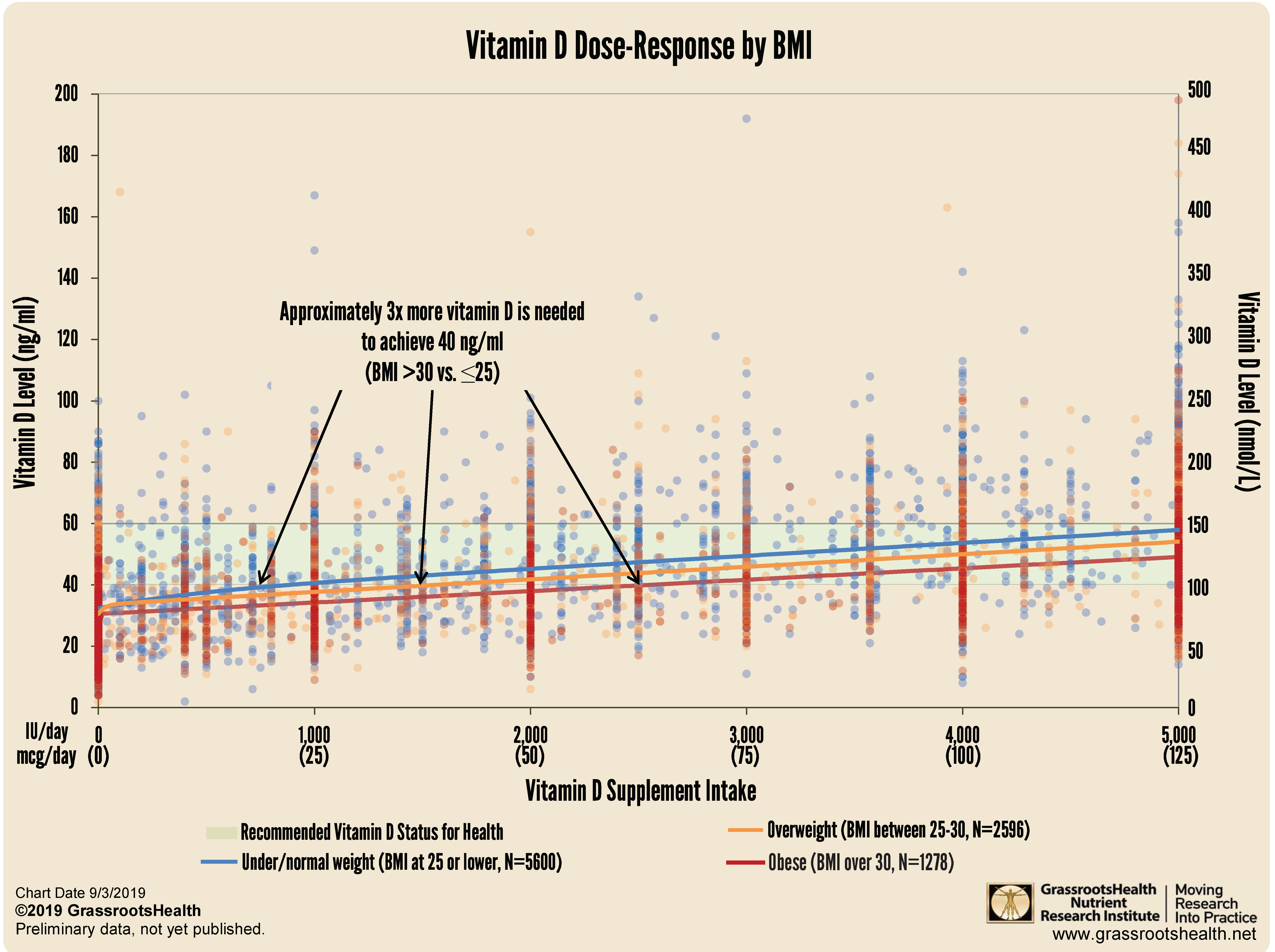Published on August 17, 2020
Evidence shows that vitamin D levels are affected by obesity. In fact, the more fat a person has on their body (the higher the BMI), the more likely they are to have vitamin D deficiency, and their need for vitamin D increases. This is one reason suggesting the same daily intake of vitamin D for all adults simply does not make sense. As you will see below, the amount of vitamin D needed on a daily basis to achieve a vitamin D level of 40 ng/ml (100 nmol/L) can vary by as much as 3 times the amount, depending on BMI.
Obesity, Vitamin D Deficiency, and COVID-19
 Of special note, obesity has been identified as a highly significant risk factor for COVID-19 disease severity and mortality. Vitamin D deficiency has also been shown to be an independent risk factor. With these considerations in mind, testing vitamin D levels and ensuring enough vitamin D is received on a daily basis to maintain a healthy level is of extreme importance, especially during this pandemic.
Of special note, obesity has been identified as a highly significant risk factor for COVID-19 disease severity and mortality. Vitamin D deficiency has also been shown to be an independent risk factor. With these considerations in mind, testing vitamin D levels and ensuring enough vitamin D is received on a daily basis to maintain a healthy level is of extreme importance, especially during this pandemic.
Dose-Response to Supplementation by BMI
Using the data you provided for the GrassrootsHealth study, we assessed the effect of BMI on vitamin D dose-response. We found that with increasing BMI, the vitamin D level associated with a given supplement dose was lower. On average, approximately three times more supplemental vitamin D was needed to achieve 40 ng/ml for those with a BMI above 30 compared to those with a BMI at 25 or lower.
This supports the research showing that those with a higher BMI will likely need to take a larger vitamin D supplement dose to achieve their target level.
Determine how much vitamin D may be necessary for you
Testing vitamin D levels is the only way to know what your current vitamin D status is. Once you have tested, use the vitamin D*calculator to determine an amount of daily vitamin D that might be needed to raise your current level to a target level. The D*calculator allows you to enter your weight, in pounds or kilograms, in order to more accurately estimate the amount of vitamin D that may be needed for you.
Are You Getting Enough Vitamin D?
Do you know what your vitamin D level is? Be sure to test today to find out, and take steps to keep it within a target of 40-60 ng/ml or 100-150 nmol/L! Give your immune system the nutrients it needs to support a healthy you and protect yourself from unnecessary diseases.
Through GrassrootsHealth Nutrient Research Institute, you can also test your essential elements magnesium, copper, zinc and selenium, toxins such as lead, mercury and cadmium, as well as your omega-3 levels, inflammation levels and thyroid stimulating hormone (TSH) level. Find out your levels today! Log on to the test selection page (click the link below) to get your tests and see for yourself if your levels can be improved.
Make sure you track your results before and after, about every 6 months!
How can I track my nutrient intake and levels over time?
To help you track your supplement use and nutrient levels, GrassrootsHealth has created the Personal Health Nutrient Decision System called
For each specific supplement, you can track what days you take it, how much, and many other details. This will help you know your true supplemental intake and what patterns of use work for you to reach and maintain optimum nutrient levels. Check it out today!








